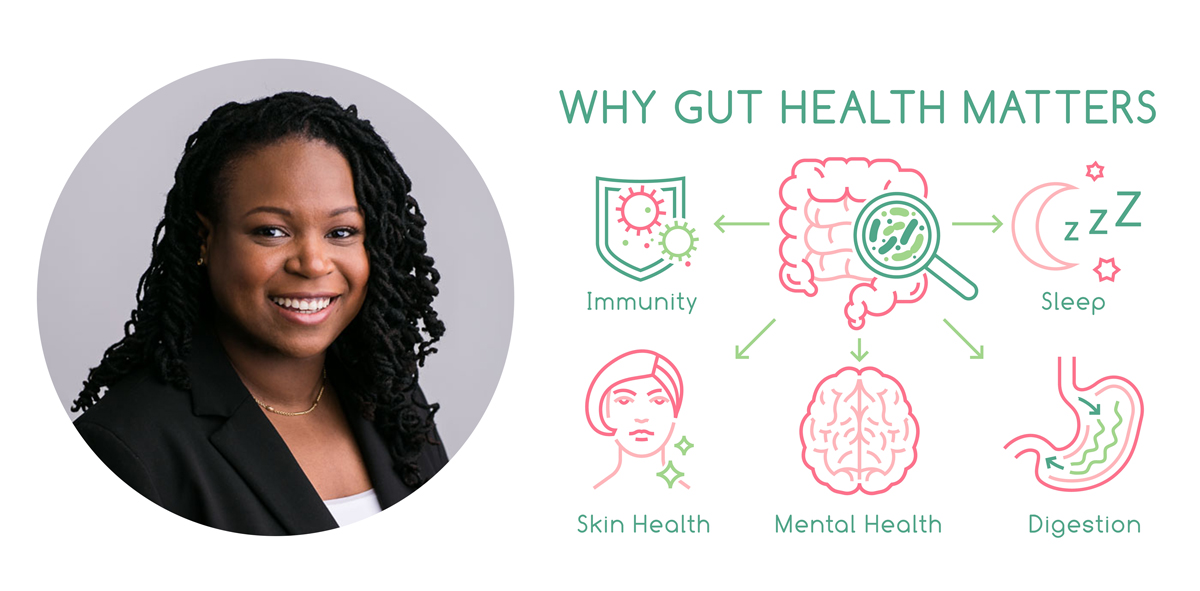Digestive Health Q&A with gastroenterologist Valerie Antoine-Gustave, MD
Gut health, digestion, microbiome, prebiotic, probiotic—these are all buzzwords we read and hear in our daily media intake. But what exactly is gut health? During Women’s History Month, I want to share the voices of medical professionals whose passion for their field of expertise is remarkable and laudable.
Meet Valerie Antoine-Gustave, MD, MPH, a board-certified gastroenterologist and a valued member of Summit Health’s gastroenterology team. In addition to being a clinical instructor at NYU Langone Medical Center, Dr. Antoine-Gustave is the Quality Committee Chair at Liberty Endoscopy Center, where she ensures rigorous standards of care and safety for patients undergoing endoscopic procedures.
Beyond her clinical practice, Dr. Antoine-Gustave is deeply committed to medical leadership, professional development, and community engagement. Actively involved in broader initiatives within the African-American community, she serves as a limited investment fund partner and advocates for health equity in her practice, ensuring all patients have access to quality care.
As a compassionate and dedicated gastroenterologist, Dr. Antoine-Gustave prioritizes patient-centered care. Her clinical expertise spans various aspects of gastroenterology and endoscopy, with a particular emphasis on women’s digestive health.
Here are some gems from our exchange!
What does a GI do exactly?
A Gastrointestinal (GI) doctor is a medical specialist who diagnoses and treats disorders related to the digestive system. This encompasses issues with the esophagus, stomach, small intestine, large intestine (colon), liver, gallbladder, and pancreas.
How is this different than practicing primary medicine?
Primary care physicians offer general health services and manage various medical conditions. Gastroenterologists specialize specifically in diagnosing and treating gastrointestinal (GI) disorders. We also conduct procedures like endoscopy and colonoscopy to visualize and treat GI tract conditions.
Why and when should you consult with a GI?
Anyone experiencing symptoms related to the digestive system may consult a gastroenterologist. Symptoms such as heartburn, abdominal pain, difficulty swallowing, diarrhea, constipation, gastrointestinal bleeding, liver disease, pancreatitis, or suspected gastrointestinal cancers are all reasons to find a specialist.
Patients should consider seeing a gastroenterologist if they have concerning or persistent digestive symptoms. Additionally, individuals with a family history of gastrointestinal disorders, those needing colorectal cancer screening, or those with chronic conditions like inflammatory bowel disease should schedule an appointment.
I primarily care for adult patients, although pediatric gastroenterologists also provide care for individuals under 18.
Are there particulars related to gut health that womxn should know about? Is there some evidence that stress levels impact some groups more than others?
During Women’s History Month, it’s essential to note that many people are unaware of the unique challenges of women’s digestive health. Women may experience certain gastrointestinal conditions more frequently than men due to hormonal fluctuations during menstruation, pregnancy, and menopause. While stress impacts gut health universally, women may be more susceptible to stress-related gastrointestinal symptoms due to hormonal influences. Hence, discussing digestive symptoms openly with your doctor is crucial for accurate diagnosis and treatment.
Why did you choose this area of specialization?
I chose gastroenterology because I find it incredibly fascinating. I appreciate the complexity of the digestive system and its vital role in nourishing the body. Additionally, the ability to prevent colorectal cancer is of particular importance to me, especially after the impact of colon cancer on my own family.
What is your single most crucial digestive health advice?
The most important advice for your digestive health is to tune in to what your body tells you. Take the time to notice how different foods make you feel and pay attention to any discomfort or changes in digestion. Your body has its way of communicating with you, so don’t ignore those signals! And don’t hesitate to share your observations with your healthcare provider. By opening up about what you’re experiencing, you’re taking an active role in your well-being and helping your provider tailor the best possible care for you. Your body deserves to be listened to and cared for, so trust those gut instincts!


Leave a Reply